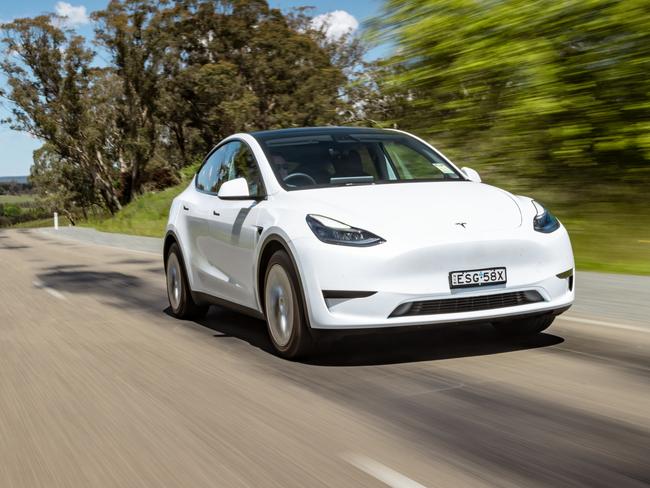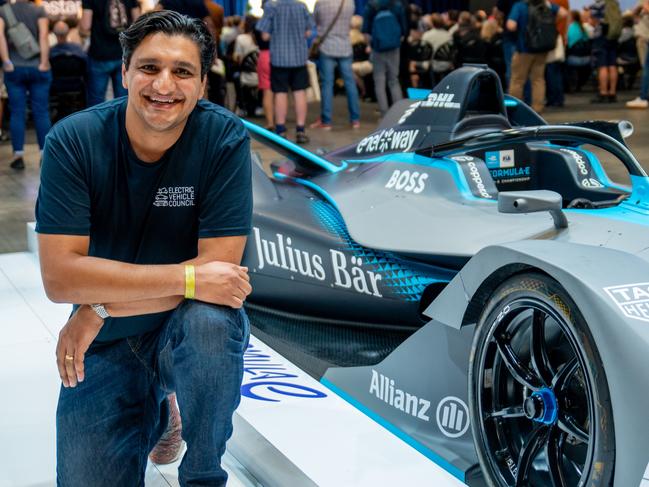‘World’s worst’: Electric Vehicle Council issues scathing attack on Victorian EV policy
A national report rating the performance of state and territory electric vehicle policy is out. See how your state or territory compares.
National
Don't miss out on the headlines from National. Followed categories will be added to My News.
A new report has launched a scathing attack on the Victorian Government, accusing it of having some of the worst electric vehicle policy in the world.
The Electric Vehicle Council’s annual State of Electric Vehicles report has taken aim at Victoria for removing electric vehicle subsidies and continuing to charge road taxes for EV owners.
The report has ranked Victoria last for its approach to electric passenger vehicles, giving it a score of three out of 10. New South Wales scored nine and Queensland eight.
It points out that Victoria is the only state or Territory in the country where there is a financial disincentive to buy an EV.
The report says the ACT offers the biggest incentives for a person buying a $50,000 EV, with a total incentive of $7731. Queensland ranks second with $6888 worth of incentives while New South Wales is third with $4500. In contrast, Victorian EV buyers are worse off to the tune of $1112.
“Disappointingly, the Victorian Government has prematurely withdrawn its EV incentive, with minimal notice to customers, no phase-out period and no modelling to understand the impact of this decision,” it says.
“Ultimately this approach, in addition to having the world’s worst EV policy with respect to taxing EVs, risks jeopardising Victoria’s ability to achieve its own emission reduction targets.”

The report says that although EV sales have surged in the first six months of the year – and are on track to more than double this year – Australia continues to lag comparable nations for consumer choice.
Australians have bought more EVs in the first half of 2023 than in all of 2022. EVs now make up 8.4 per cent of the total new-car market, up from less than one per cent in 2020. Nevertheless, Australia still lags nations such as the United Kingdom, France and Germany, where EVs make up more than 20 per cent of new-car sales.
It estimates that there are more than 109,000 EVs on Australian roads, but the report also highlights a worrying shortfall in charging infrastructure.
There are just 967 public fast chargers across the country, which equates to one charger for every 113 EVs on the road.
“The availability of public high power EV charging continues to be top of mind for the EV industry and for motorists,” the report says.
Work needs to be done to help shopping centres and apartment complexes to install public chargers, it says.
New South Wales has the most public chargers, followed by Victoria and Queensland.

EV Council chief executive, Behyad Jafari, said that although the growth in sales was encouraging, the market was dominated by Tesla.
Between them the Tesla Model Y and Model 3 make up more than half of Australia’s EV market.
Mr Jafari called on the Federal Government to introduce an enforceable CO2 emissions target by the end of the year, with penalties for carmakers who continue to sell high-emitting vehicles.
He said that without an enforceable target the supply of EVs to the local market would continue to be constrained, as car makers sent their EVs to markets with tougher emission laws.
Global carmakers were “still only sending a trickle of the vehicles they produce to the Australian market, because we remain one of the few nations on earth without new vehicle efficiency standards,” he said.
“Our lack of new vehicle efficiency standards means car makers are essentially rewarded for sending their EVs to markets other than Australia. So small wonder we remain at the back of the queue,” he said.
“If the Australian Government gets on with introducing strong new vehicle efficiency standards, we will see consumer choice expand rapidly.”
He said regulatory barriers regarding vehicle weight and width were also holding back the supply of electric trucks and buses, which meant the country was “missing a crucial opportunity” to decarbonise freight and public transport.
“Without immediate action, the decarbonisation of Australia’s 800,000 buses and trucks will continue to be delayed, leaving consumers to pay more for goods and communities breathing in more pollution,” the report says.





